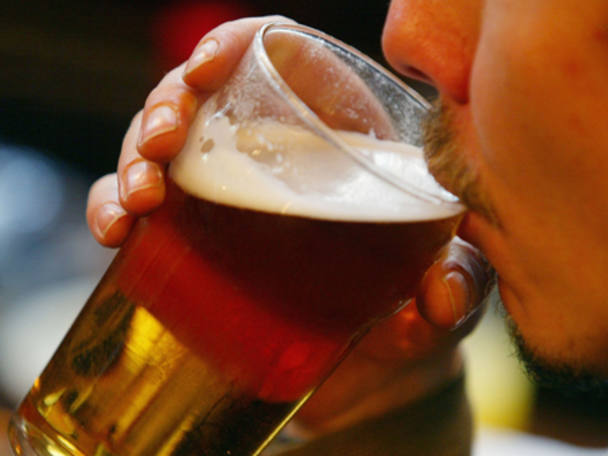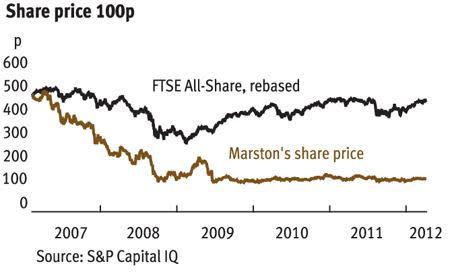With 8.4 per cent of the UK's workforce unemployed and the government forecasting economic growth of just 0.8 per cent in 2012, consumers are certainly struggling. Yet, amid the gloom, there are signs of a modest retail recovery. Last month, for example, the Office for National Statistics reported that January's sales volumes had risen 2 per cent year on year, and by 0.9 per cent on the previous month. True, that hardly signals a retail sector boom, but it does suggest that investors shouldn't avoid all consumer-facing businesses. And pubs group Marston's, which includes the Pitcher & Piano chain, looks well placed.
- Trading well
- Events in 2012 to boost trading
- Recovery at the tenanted division
- Impressive dividend yield
- Challenging consumer backdrop
- Hefty debt burden
For starters, Marston's current trading is healthy. Earlier this month it reported that, in the 23 weeks to 10 March, like-for-like sales at its managed pubs had risen 3.5 per cent. Like-for-like food sales rose by an even stronger 3.9 per cent, while drinks sales increased 3.4 per cent. Not all pubs operators can point to such growth. JD Wetherspoon, for example, reported at the half-year stage this month that its like-for-like sales had slipped 0.7 per cent. Brewed beer volumes at Marston's, which includes such brands as Banks's, Brakspear and Mansfield, remain in good shape, too – bottled-ale volumes grew 10 per cent in the 23 weeks, with volumes of premium cask ales up 2 per cent.
The group is even making progress in its tenanted estate. That operation looked distinctly troubled in the not-so-distant past; its like-for-like profits slipped 1.5 per cent in the year to end-September 2010, for instance. However, the tenanted performance has been gradually turned around since the group began implementing a new retail agreement in 2009. That involves supplying pubs with food as well as drink, providing refurbishment funds and playing an active role in deciding the details of the wider offering that's available at individual pubs – in exchange for a portion of the revenues. That focus has enabled the tenanted estate to report a 3 per cent rise in underlying profit in the 23 weeks to 10 March, which management flags as "robust trading in the traditional tenanted estate".
MARSTON'S (MARS) | ||||
|---|---|---|---|---|
| ORD PRICE: | 100p | MARKET VALUE: | £571m | |
| TOUCH: | 99-100p | 12-MONTH HIGH/LOW: | 113p | 83p |
| DIVIDEND YIELD: | 6.1% | PE RATIO: | 8 | |
| NET ASSET VALUE: | 143p | NET DEBT: | 135% | |
| Year to end-Sep | Turnover (£m) | Pre-tax profit (£m) | Earnings per share (p) | Dividend per share (p) |
|---|---|---|---|---|
| 2008 | 666 | 76.2 | 16.3 | 9.5 |
| 2009 | 645 | 21.4 | 3.9 | 7.1 |
| 2010 | 651 | 52.5 | 8.3 | 5.8 |
| 2011 | 682 | 80.8 | 12.1 | 5.8 |
| 2012* | 740 | 89.0 | 12.3 | 6.1 |
| % change | +9 | – | – | +5 |
WH Ireland estimates (profits & earnings not comparable with historic figures) Normal market size: 10,000 Matched bargain trading Beta: 1.0 | ||||
In addition, Marston's should see a trading boost on the back of a stream of one-off events this year that could pull rather more drinkers into its pubs than would usually be the case. "Full-year 2012 will benefit from the diamond jubilee, Euro 2012 and the Olympics," says Stuart Forshaw, an analyst at broker WH Ireland. Partly as a result, the broker forecasts that underlying earnings per share at Marston's will grow by a downturn-beating 10 per cent in the year to end-September.
The group remains focused on expansion as well, and has been busy bolstering the size of its pubs estate. Over the past five years it has opened around 50 pubs, at a cost of roughly £2.5m per pub, and now has an estate that's about 2,150-strong.
The pace of expansion is to increase, too. From this year management plans to open around 25 new pubs annually. Admittedly, against the backdrop of fragile consumer conditions such ambitious expansion plans are not without risk. Moreover, such expansion has helped burden the group with a hefty debt pile – £1.1bn at the end of September, which is roughly twice the market value of the company's equity. The associated interest bill reached £71m in 2010-11.
Still, the prospective dividend yield, at 6.2 per cent based on WH Ireland's forecast payout, is certainly attractive, even though the bumper payments of 2008 and 2009 have been cut back. In fact, Marston's looks like the best income play in the pubs sector, with rivals Enterprise Inns and Punch Taverns paying no dividend; while shares in JD Wetherspoon and Greene King yield around 3 per cent and 4 per cent respectively.










